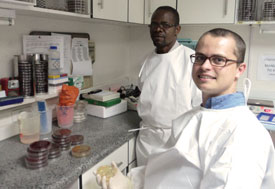Tracking drug-resistant TB in Malawi
March / April 2012 | Volume 11, Issue 2
By Steve Goldstein

Photo courtesy of Brian Barnett
Fulbright-Fogarty Fellow Brian Barnett, who is
studying HIV/AIDS in Malawi, says there will
always be a global component to his work.
Brian Barnett knew firsthand about holes in the health care system well before he arrived in Malawi as a Fulbright-Fogarty fellow.
Barnett's home county of 15,000 in rural Kentucky was served by one doctor. "We have all the typical southern health problems in my family: diabetes, heart disease and the like," he said. "Every time someone needed medical care it was a two-hour drive to Lexington. In the developing world, people might have to travel two days and still not get the kind of care they need."
Now Barnett is studying HIV/AIDS, tuberculosis and mother-to-child transmission of disease, based at the University of North Carolina's project in Lilongwe. The aim is to enroll all patients with first-time tuberculosis who are registering at the center for outpatient treatment. Using liquid culture methods, which allow for quick detection of TB drug resistance, they are analyzing sputum samples to quantify the prevalence of multiple drug resistant TB (MDR-TB) in Lilongwe.
"Our collection of demographic data will help us to better characterize the impact of drug resistant TB in these individuals," said Barnett. He said he is learning "a significant amount" about the pathology, diagnosis and treatment of tuberculosis, especially in those with HIV, who comprise about 60 percent of enrollees. Barnett said the fellowship has also taught him to cope with unforeseen issues, such as a prolonged fuel shortage and a lack of foreign currency, which has affected the ability to import supplies.
He admits that the effect of the AIDS epidemic in Africa was an abstract concept for him prior to his arrival in Malawi. The fellowship has allowed him to see the devastating impact firsthand, he said. It’s also afforded him valuable experience overseeing a research project and managing all aspects of it, from collection of data to determining a budget, to directing staff and eventually analyzing data and disseminating his interpretation.
"Before this fellowship, I would have had trouble deciding what to do for my residency next year," said the fourth-year student at the Vanderbilt University School of Medicine. "This experience will determine what I really want to do and I know there's always going to be a global component to my work."
More Information
To view Adobe PDF files,
download current, free accessible plug-ins from Adobe's website.